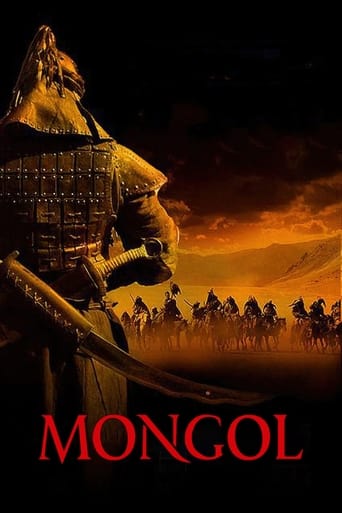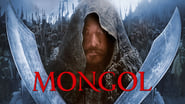SnoopyStyle
In 1192, Temüjin is a prisoner of the Tangut kingdom. Twenty years earlier, he's a young boy taken to choose a wife. He picks Börte and agrees to return after 5 years. His Khan father is poisoned and follower Targutai leads a revolt. Temüjin is saved when Targutai accepts the tradition of not killing children. Temüjin barely survives and makes Jamukha his blood brother. He would be taken prisoner and enslaved. With Börte, he becomes a great leader leading to a rivalry with Jamukha.This is a compelling story. I really like the driven Temüjin boy. The action is violent. There is a desolated brutality to the landscape. The movie does get a little slow after Temüjin is imprisoned in Tangut. It needs to raise the intensity of that section leading up to the climatic battle.
g-bodyl
As a student of history, it would be beneath me to avoid a movie depicting the early life of perhaps the greatest Mongolian ever to inhabit this planet. Because it's not a Hollywood production, the accuracy is not questioned and the film gives a character study, not just a battle arena. However, there are just enough battles and blood to satisfy action fans. But I truly enjoyed the fact that the film points out the early Mongolians were not just blood lust, but they had a culture which incorporates religious and family aspects.Sergei Bokrov's film is about the early life of Temujin as he endured enslavement as a child and how he rises politically with a goal to unite all Mongolians as he defeat the local tribes to band them together as one.This film is well-acted for the most part. Tadanobu Asano is excellent as Genghis Khan and not only he portrays Khan as a violent man, he portrays him as a man who does have a soft side, especially when it comes to his family. However, I'm not sure what to think about the performance of Sun Honglei as Jamukha. His acting seemed to be a little over-the-top.Overall, Mongol is a fascinating film about a man people really don't know too much about. The film has good central themes regarding abduction, family, love, and leadership. The film features sweeping and gorgeous cinematography as the film was shot in some of the most beautiful locations on this planet. The action and drama intermingle with each other very well. On the whole, I was quite pleased with this film. I rate this film 8/10.
l_rawjalaurence
Some reviewers have referred to the fact that MONGOL: THE RISE OF GENGHIS KHAN is a low-budget epic, as compared to its Hollywood equivalents. What makes this film so outstanding is its un-likeness to the Hollywood product; rather than focusing on special effects, Sergey Bodrov's film centers on Temudjin (Tadanobu Asano) and the way in which he develops the kind of iron will that transforms him into a great leader. Although repeatedly captured by his enemies, including arch-bad guy Jamukha (Honglei Sun), he always finds a way out to return to his wife Borte (Khulan Chuluun), with a combination of brute force and low cunning. Structurally speaking, MONGOL: THE RISE OF GENGHIS KHAN is structured around a series of conflicts between various factions in twelfth century Mongolia, each vying for power. The prestige attached to being called "Khan" is so great that it attracts rival leader Targutai (Amadu Mamadakov) - although he repeatedly describes Temudjin as his brother, we know that this is a term of convenience. Bodrov's film contains some stunning landscape shots: filmed in the wilds of Mongolia, as well as Kazakhstan, this is a visual feast, making us aware of how insignificant human beings can be when set against the world they inhabit. It is a tribute to Asano's performance as Temudjin that he manages to transcend this feeling and come across as a genuine hero, one who could quite literally conquer the landscape. The battle-sequences are brilliantly filmed, as are the scenes showing the Mongols galloping across the terrain on horseback: Bodrov's tracking shots are some of the best I have seen in a modern epic. MONGOL: THE RISE OF GENGHIS KHAN is rip-roaring entertainment on the one level, but also demonstrates an alternative cinematic treatment of the epic genre.
museumofdave
The Historical Epic is a disappearing staple from Hollywood, but many of them are still made in other parts of the world where it is probably a good deal cheaper to do so--Mongol is a perfect example, a grand, sweeping biographical tale about the development of a leader--this time set in Mongolia in the 12th Century.The scenery in Mongol is incredibly varied and beautiful and the battle scenes, when they come, are stark and brutal, but the main focus here is the development of the main character from childhood to maturity.Tadanobu Asano captures the quiet tenacity of a young man whose loyalties are to a way of life he chooses to defend: he picks out a wife when he is 9 years old (she later claims she chose him), and remains faithful to his idea of family and home no matter what the exterior challenges--it's a humane film about a violent time, charged with mythic resonance and incredible scope.




